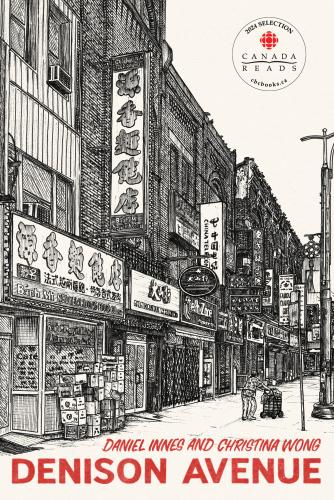Shortlisted for 2024 Canada Reads
Finalist for the 2024 Carnegie Medals for Excellence through the American Library Association
A moving story told in visual art and fiction about gentrification, aging in place, grief, and vulnerable Chinese Canadian elders
Bringing together ink artwork and fiction, Denison Avenue by Daniel Innes (illustrations) and Christina Wong (text) follows the elderly Wong Cho Sum, who, living in Toronto’s gentrifying Chinatown–Kensington Market, begins to collect bottles and cans after the sudden loss of her husband as a way to fill her days and keep grief and loneliness at bay. In her long walks around the city, Cho Sum meets new friends, confronts classism and racism, and learns how to build a life as a widow in a neighborhood that is being destroyed and rebuilt, leaving elders like her behind.
A poignant meditation on loss, aging, gentrification, and the barriers that Chinese Canadian seniors experience in big cities, Denison Avenue beautifully combines visual art, fiction, and the endangered Toisan dialect to create a book that is truly unforgettable.
A story told in two parts as a graphic novel and novella, about elderly Wong Cho Sum’s attempt to cope with the death of her husband by taking up bottle and can collecting. Denison Avenue explores the price of progress in cities like Toronto and those it leaves behind.
“Wong and Innes have created something truly special in this multi-faceted book. Innes’ detailed and beautiful hand-drawn illustrations depicting the changes in the community are eye-catching complements to Wong’s writing and can stand on their own.” — Booklist, starred review
“But the true triumph of this production is bringing the Taosan dialect to life. The dialogue is performed first in Taosan and then in English. While most listeners will only understand the English, it is a rare and culturally astute choice that lets listeners experience the languages side by side...this audio will engage listeners craving something new and soothe anyone who knows what it's like to love a city that doesn't always love you back.” — Booklist
“I spent my formative years in Kensington Market. I still go to Chinatown multiple times a week to eat. I love it so much, it’s a place that truly brings me so much joy. Denison Avenue shows us the realness of how the buildings are changing, the restaurants are changing, and the love that has slowly been taken away in the process. A beautiful book that shares stories of love and loss.” — Matty Matheson, celebrity chef
“The magnificent Denison Avenue will tell you a story you've never heard before — about people you think you know in your neighbourhood. It will change you. It will change how you look at people on the bus and on the streets. It will change how you live your life.” — Naheed Nenshi, former Mayor of Calgary, for CBC’s Canada Reads
“Wong's performance captures the isolation and displacement often experienced by the elderly, along with the scourge of gentrification. It's a thought-provoking lament for what used to be.” — AudioFile
“In Denison Avenue, we watch a recent widow desperately tread water in a city drowning under waves of gentrification. This tender lyrical novel is an anthem of grief, a swan song to cities as we know them and the loved ones we lose along the way.” — Catherine Hernandez, author and screenwriter of Scarborough, the novel and film
“The book reminds those of us who live in cities across the world that it is important to consider the heritage and legacies of neighborhoods in many cities and the ways that gentrification affects the people who live there.” — Shondaland
“With its intricate line drawings and poignant story, Denison Avenue transports me to a place I’ve never been, but also to a place that feels like home. From canned fried dace and butter cookie tins to the sonorous tones of the Toisanese dialect, this is the world of my ancestors — the lo wah kiu who flourished in Chinatowns all over Canada. And as we walk alongside Wong Cho Sum in her personal journey through grief, we grieve, too, for past generations and the loss of a once-thriving community.” — Teresa Wong, author of Dear Scarlet
“Christina Wong writes from the perspective of an elderly immigrant widow who collects bottles and cans in the streets and alleys of Toronto. It’s a thoughtful account of a difficult journey in a vanishing neighbourhood, complete with time capsule illustrations of Chinatown and Kensington Market by Daniel Innes. Denison Avenue is designed for people like me who fall in between the cracks of culture. I enjoyed reading the phonetic Cantonese and Toisan dialect translations in English that connected me to familiar languages and my neighbourhood.” — Sook-Yin Lee, filmmaker, musician, and broadcaster
“What is a city but its stories? In Denison Avenue, Christina Wong’s elegant prose and poetry are accompanied by beautifully rendered illustrations by Daniel Innes, bringing to life the portrait of a Chinatown that is both disappearing and emerging. Through Mrs. Wong’s eyes, we witness a rapidly changing city. We travel with her through streets with names like Nassau, Cecil, Ulster, pass familiar noodle joints and Chinese bakeries, follow her cart from bin to bin. And yet Mrs. Wong shows us with keen observation the small joy one can have by eating a doong on a park bench or the delight in bumping into an old friend at Honest Ed’s, shopping for deals. I can hear her voice in Toisan, a song of love, kinship, and a collective memory of Chinatown. What is a city but its stories? Denison Avenue is a Toronto story.” — Carrianne Leung, author of That Time I Loved You

